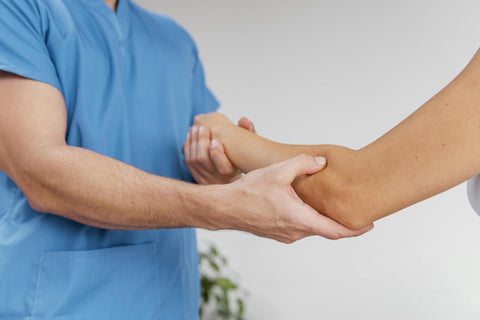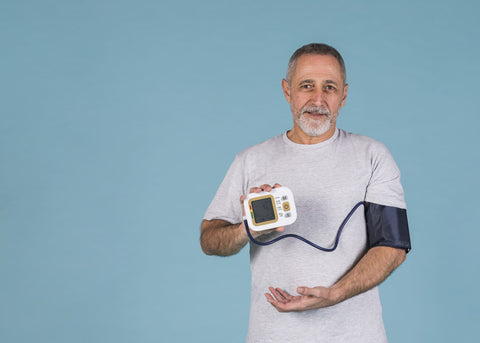Many people with poor joint and bone health believe that their problem is just a matter of bad luck or ageing. Fortunately, by addressing the true causes and implementing the listed below principles you can greatly improve your joint and bone health.
Causes of Osteoarthritis and Poor Joint Health
It has been discovered that osteoarthritis involves not only cartilage degeneration but the entire joint area, including the bones and synovial fluid. The cells in all these tissues start degenerating for a reason.
The insufficient self-repair caused by a bad diet, deficiency of nutrients, poor blood circulation, and clogged capillaries make joints unable to regenerate the damaged cartilage. The blood can’t flow through those tiny blood vessels causing oxygen and nutrients are not delivered to the joint tissue.
Lack of nutrients and poor oxygenation of the cells found in joints interferes with the efficient repair and regeneration of joints leading to degeneration and increased pain.

Also, regular consumption of sugar and other refined foods, makes the joint cells unable to generate enough energy to maintain their regeneration. As a result, cells make too much glucose in order to cope with this lack of energy. The unused glucose is converted into lactic acid, which triggers inflammation in joint cartilage, contributing to osteoarthritis.
Many people with osteoarthritis have calcium crystals deposited in their joint cartilage. This inorganic calcium accumulation is caused by drinking hard water (high in inorganic calcium), and a high intake of calcium carbonate from supplements and fortified foods.
This calcification process is made worse by the widespread vitamin K2 deficiency as this vitamin makes sure that calcium is deposited only in bones and not in the cartilage, blood vessels or internal organs.
Causes of Osteoporosis and Weak Bones
Deficiency of Vitamin D, K2, Magnesium, Boron, Zinc, and Silica plays a significant role in poor bone health. Vitamin D and K2 are required for the production and proper function of the enzyme osteocalcin required for the proper bone-forming process. Silica, Boron, Magnesium, and Zinc play key roles in bone formation and bone health. Like Vitamin K2 and Vitamin D, they improve calcium absorption and prevent bone loss.
Lack of exercise causes us to lose more than 1% of bone mass per every month. Physical activity improves blood circulation in bones and stimulates the natural need for strong bones to prevent fractures during exercise. When we are physically active, bone cells absorb more calcium and other nutrients to strengthen themselves.
Drinking milk and regular consumption of any animal protein found in dairy and meat products contribute to osteoporosis and hip fractures. Animal protein makes the blood acidic forcing the body to use calcium from bones to make the blood more alkaline. In this way, it interferes with the retention of calcium and causes more calcium to be lost than saved. Also, zinc, which is required for healthy bones, is lost when a high animal protein diet is consumed.
African, Chinese, and South Korean women whose diet is either entirely plant-based or very low in animal protein do not develop osteoporosis during menopause. On the other hand, in America and Scandinavian countries, where dairy consumption is the highest in the world, the prevalence of osteoporosis and hip fractures is the highest too.
Sugar, coffee, cola drinks, tea, and chocolate block calcium absorption from food contributing to osteoporosis and hip fractures.
Dietary and Lifestyle Recommendations
Unclog your capillaries (smallest blood vessels) and boost blood circulation in your joints and bones. You can do it through regular physical activity, a healthy diet, and by using Ginkgo biloba extract. Otherwise, because of poor circulation and clogged capillaries, your bones and cartilage will not receive enough oxygen and nutrients. As a result, they will not be able to detoxify, rebuild and regenerate themselves.
Numerous studies demonstrated that a whole-food plant-based diet significantly improved the health of individuals suffering from osteoporosis and osteoarthritis. Arthritis and osteoporosis are more prevalent in populations with high meat and dairy consumption. People with poor joint and bone health always greatly benefit from positive dietary changes.
Avoid foods and fats high in proinflammatory omega-6 fatty acids. That includes sunflower oil, corn oil, soya oil, vegetable oil, and margarines. Instead, use raw organic coconut oil and cold-pressed olive oil.
Replace refined sugar and high fructose/glucose syrup with good sweeteners such as erythritol, xylitol, or stevia.
It is crucial to hydrate joints and bones by drinking 8-10 glasses of clean (filtered) water every day.

Key Nutritional Supplements
The following nutritional supplements are most vital for bone and joint health support:
- Vitamin D3 (3000-5000 IU daily)
- Vitamin K2 MK-7 (50-200mcg daily)
- Boron (3mg daily)
- Magnesium (150-200mg twice daily)
- Zinc (10-20mg daily)
- Organic Calcium such as Calcium Citrate
All these vitamins and minerals are included in Osteozin (HealthAid). For even better results, take Osteozin with additional Vitamin D3 (2000 IU to 5000 IU daily) and Silica (from bamboo extract).
Vitamin K2 (MK-7) plays a key role in bone and joint health. It makes sure calcium is deposited in your bones where it is needed to make them strong. At the same time, Vitamin K2 is the best way to prevent the same calcium from being deposited in your joints. When calcium is deposited in joints, it contributes to arthritis.
Boron is one of the most vital supplements to benefit bone and joint health. In countries with a low concentration of boron in the soil arthritis and osteoporosis are much more common. Make sure that your daily boron intake is at least 3mg.
Osteoflex Plus formulation provides excellent nutritional support for joints and bones. It is a unique combination of high-grade Glucosamine, Chondroitin Sulphate and Hyaluronic Acid, with added Vitamin C, Turmeric and Manganese. It helps collagen formation for the normal function of cartilage and bones.
Glucosamine is used to form various chemicals needed to repair cartilage, tendons, and ligaments.
Hyaluronic acid supplements have been shown to help improve joint health.
Turmeric and its key active ingredient Curcumin may help ease pain and inflammation.
Take nutritional supplements containing MSM (a form of natural sulphur) as it is essential to rebuild bone, cartilage, and connective tissue.
Rosehip extract from Rosa canina (dog rose) has been shown to help ease arthritis when taken daily. It has anti-inflammatory properties and blocks the activation of proteins in cartilage cells that cause the degradation of joint tissue.
A deficiency of Magnesium and Vitamin B6 in animals contributes to arthritis and osteoporosis. Take 200mg of pure Magnesium citrate powder twice daily.
Omega-3 may help to ease inflammation and pain caused by chronic conditions such as osteoarthritis.
Bromelain found in fresh pineapples and supplements may reduce levels of prostaglandins, which are hormones that induce inflammation.
Take Super Greens (HealthAid) to make your blood less acidic and more alkaline to help reduce calcium loss from your bones.
External Applications
Osteoflex cream provides a unique combination of high-grade Glucosamine and Chondroitin Sulphate with added essential oil and menthol to help maintain supple, flexible joints, and strong cartilage.
Water treatments can be very helpful if performed daily, especially alternative heat and ice therapy. It reduces pain, improves blood circulation, and elimination of toxins. It also stimulates new bone formation and regeneration of the damaged cartilage.
Always start with heat treatment in the form of a hot water bottle, electric heating pad, hot shower, or hot towel compress. After about 3 minutes, when the treated area is warm enough, apply an ice pack, or any very cold application, for about 2-3 minutes. Then, alternate the hot and cold application back and forth 5-7 times in a row.
Sources
https://p.widencdn.net/fhiuem/Foods-and-Arthritis
https://www.pcrm.org/news/health-nutrition/high-fiber-diet-lowers-risk-arthritis
http://noarthritis.com/research.htm
http://www.greenmedinfo.com/disease/arthritis
Dai Z, Niu J, Zhang Y, Jacques P, Felson DT. Dietary intake of fibre and risk of knee osteoarthritis in two US prospective cohorts. Ann Rheum Dis. Published online May 23, 2017.
Runhaar J, Deroisy R, van Middelkoop M, et al. The role of diet and exercise and of glucosamine sulfate in the prevention of knee osteoarthritis: Further results from the Prevention of knee Osteoarthritis in Overweight Females (PROOF) study. Semin Arthritis Rheum. 2016;45 (4 Suppl): S42-8.
Yves Henrotin, PhD,1 Mariane Mathy, PhD,2 Christelle Sanchez, PhD,2 and Cecile Lambert, PhD2. Chondroitin Sulfate in the Treatment of Osteoarthritis: From in Vitro Studies to Clinical Recommendations. Ther Adv Musculoskelet Dis. 2010 Dec; 2(6): 335–348.
Funk JL, Oyarzo JN, Frye JB, Chen G, Lantz RC, Jolad SD, Sólyom AM, Timmermann BN. Turmeric extracts containing curcuminoids prevent experimental rheumatoid arthritis. J Nat Prod. 2006 Mar; 69(3):351-5. PubMed PMID: 16562833;
Brody, Jane, “China Study Challenges Diet Myths,” The Atlanta Journal and Constitution, 1990
Ellis, Holesh, and Ellis, “Incidence of Osteoporosis in Vegetarians and Omnivores”, Journal of Clinical Nutrition, 1972
Thrash, Calvin, Dr.; Thrash, Agatha, Dr., Nutrition For Vegetarians, Seale, AL: New Lifestyle Books, 1982
Dawson-Hughes, Bess, “Calcium Supplementation and Bone Loss”, American Journal of Clinical Nutrition, 1991
Image by stefamerpik on Freepik
Image by stefamerpik on Freepik
Image by Freepik
Any information or product suggested on this website is not intended to diagnose, treat, cure or prevent any medical condition. Never disregard medical advice or delay in seeking it because of something you have read on this website. Consult your primary healthcare physician before using any supplements or making any changes to your regime.





